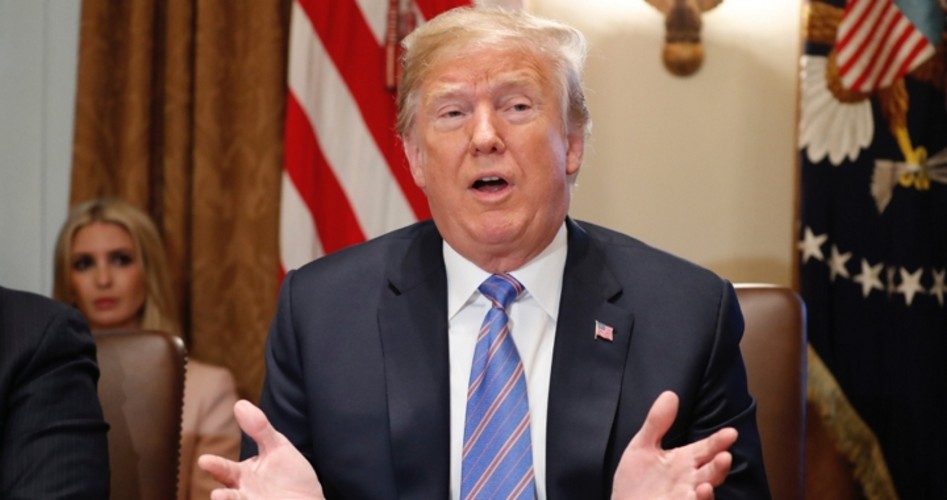
“The sentence should have been, ‘I don’t see any reason why I wouldn’t, or why it wouldn’t be Russia,” instead of ‘why it would’ [be Russia],” President Donald Trump lamely said Tuesday, backtracking on his remarks made during a press conference with Russian President Vladimir Putin.
In his original remarks, Trump expressed confidence in the American intelligence agencies who have insisted that Russia meddled in the 2016 presidential election, but then added that he did not know why it “would be Russia” that did the meddling. Trump’s original remarks were met with a flurry of condemnation, even by many Republicans and even some of Trump’s stronger allies in the media.
Speaking to MSNBC’s Rachel Maddow a few days before Trump was sworn in, Senator Chuck Schumer (D-N.Y.) warned Trump that he was being “really dumb” for picking a fight with intelligence officials. Schumer suggested that they have many ways to strike back, after the president-elect speculated that his “briefing” about Russian cyberattacks had been delayed in order to build a case.
“Let me tell you: You take on the intelligence community — they have six ways from Sunday at getting back at you,” Schumer said, after intelligence sources told NBC news that the briefing had not been delayed. Apparently, one of the six ways is to strike back at an incoming president by leaking to a news organization known to be unfriendly to Trump.
The lesson is clear — presidents come and go, but the “intelligence community” cannot be questioned, lest the questioner be branded as unpatriotic, or even treasonous.
Before World War II and the Cold War, the United States had only a limited intelligence “community,” which is to be expected in a free society. “Secret police” were historically associated with repressive regimes such as Napoleon’s France, Czarist Russia, the Soviet Union, and Nazi Germany, but not free societies such as America. During World War II, “intelligence” became more important, and the Office of Strategic Services (OSS) was born.
The need for the gathering of information during wartime is obvious, but even then, there is the danger that such agencies can expand beyond that role and do more than simply provide information to elected leaders. For example, Frank Dorn, in his book Walkout with Stilwell, wrote that General Joseph Stilwell directed officers of the OSS to make contingency plans to assassinate Chiang Kai-shek, the head of state of our wartime ally, China.
As World War II ended, and the Cold War with the Soviet Union began, there was growing pressure to create a peacetime foreign intelligence-gathering organization. Historian Robert Dallek has written, “The fear generated by competition with a nation like the USSR, which had elevated control of every aspect of society to a science, encouraged the belief in the United States that it desperately needed military might and counterespionage by agencies that could outdo the Soviet spymasters.”
There were concerns expressed that such an agency may eventually be too difficult for even a president to control, but as Dallek added, “But to resist the agency’s creation seemed close to treason.” Or, as Trump has discovered, even to question their findings.
Even President Harry Truman’s reluctance in creating the Central Intelligence Agency (CIA) was overcome. Years later, he expressed his frustration at what the CIA had become: “It was not intended to be a ‘Cloak and Dagger’ outfit! It was intended merely as a center for keeping the President informed on what was going on in the world.” Truman told biographer Merle Miller that the creation of the CIA “was a mistake. If I had known what was going to happen, I never would have done it.… It’s become a government all of its own and all secret … that’s a very dangerous thing in a democratic society.”
President John F. Kennedy was even blunter when he said, not long before his November 1963 assassination, that he wanted to “splinter the CIA into a thousand pieces and scatter it to the winds.”
The CIA was sold as a tool to counter to the Soviet Union, our great enemy that was attempting to spread communism across the globe. Yet, President Barack Obama’s director of the CIA was John Brennan, who had voted for the Communist Party candidate for president, Gus Hall, in 1976. The U.S. Communist Party was a wholly-owned subsidiary of Moscow, and yet Brennan, who voted for that party’s candidate for president, had the audacity to question the patriotism of those who work for Trump, and even to accuse Trump of being guilty of treason!
How could Trump possibly question the conclusions of an intelligence community that has grown beyond just the CIA to include other spy agencies such as the NSA? Perhaps it is because some of its leaders have been shown be to be wrong in their conclusions. And in some cases, their conclusions may be deliberately misleading.
When former Director of National Intelligence James Clapper was asked by a Senate committee, “Does the NSA collect any type of data at all on millions, or hundreds of millions of Americans?” Clapper replied, “No sir,” adding, “not wittingly.”
Later, when it was demonstrated that Clapper had lied, under oath, to Congress, he admitted that his testimony was “the least untruthful” statement he could make. Since that time, Clapper has appeared on cable TV, arguing that Trump had lied in saying that there was surveillance of Trump Tower carried out under President Obama. We now know that intelligence agencies did spy on candidate and later, President-elect Trump.
The failures of the American intelligence community, whether through outright duplicity or gross incompetence, are legendary. Among the more notorious are the Bay of Pigs fiasco. The intelligence community failed to predict the Tet offensive by the North Vietnamese in 1968, the Yom Kippur War in 1973, the Soviet invasion of Afghanistan in 1979, and the 9/11 attacks in 2001.
In August 1978, just six months before the shah of Iran was forced to escape the country, the CIA had confidently stated, “Iran is not in a revolutionary or even a pre-revolutionary situation.”
And, of course, there was the assertion concerning Iraq’s weapons of mass destruction. In October 2002, an intelligence estimate even concluded that Iraq was on the verge of developing a nuclear weapon. (In this case, there are indications that the Bush administration ignored all intelligence reports that this might not be the case).
With a record like that, it is reasonable for an American president to question the veracity of reports that Russia attempted to affect the outcome of the 2016 presidential election, especially when the intelligence “community” is so openly antagonistic to the president.
Ned Ryun, CEO of American Majority, appearing with Tucker Carlson in July 2017, summed up the problem when he spoke of the attitude of the intelligence agencies: “I think that they have decided they are the ones calling the shots. They feel they don’t have to listen to Trump.”
Carlson agreed: “We give enormous power and huge budgets to our intelligence agencies. And to see the information they gather secretly used for political purposes domestically is a total perversion.”
It is a total perversion — of the U.S. Constitution. But as can be seen in Trump’s punishment by “friend” and foe alike, and his subsequent back-tracking, it is a reality.
Photo: AP Images



